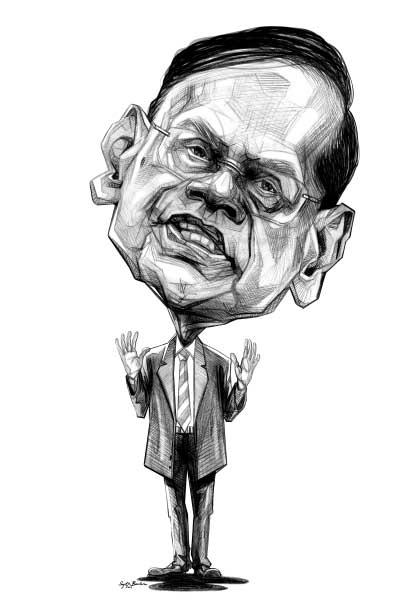27 Mar 2019 - {{hitsCtrl.values.hits}}

Sri Lanka Podujana Peramuna (SLPP) Chairman Prof. G.L. Peiris, in an interview with Daily Mirror, airs out his views on bilateral talks with the Sri Lanka Freedom Party (SLFP). Prof. Peiris, who is also a member of the SLPP team assigned for talks, said a certain measure of confidence-building was essential. Besides, he deals extensively on the proposed Counter -Terrorism Bill. Excerpts of the interview:
Q How far have you progressed in talks between the two parties?
Cosmetic arrangements just for the purpose of elections are not going to be useful. We thought a long-lasting arrangement would have to reflect a degree of consensus with regard to policy. We were able to agree on 20 main issues. That is something we are pleased with. The whole purpose of this exercise is confidence-building. Ours is a party having 3,365 members elected on February 10, 2018 to the local authorities. We have to carry them with us.
Q Is there any trust deficit then?
 There is dissatisfaction about the SLFP refraining from voting at the second reading of the budget. They criticised the budget. When it came to the crucial point, they protected the UNP.
There is dissatisfaction about the SLFP refraining from voting at the second reading of the budget. They criticised the budget. When it came to the crucial point, they protected the UNP.
There are other issues too. They have teamed up with the UNP at 21 local bodies to grab power. We agreed that confidence could be built by the two parties working together at those local bodies.
It is a misnomer that this bill deals with fundamental rights and freedom. This treats terrorists with kid gloves. The true purpose of this bill is entirely different. It is intended to suppress democratic dissent in all forms; agitation, protests and so forth. We are in a situation where the government, with impunity, is refusing to hold elections. Provincial Council elections in three provinces are overdue for one and a half years
Q How positive are you of the outcome of talks?
I do not think it would be proper for me as the SLPP Chairman to forejudge anything. It has to be fair on both sides. The identity of each party should be respected. Of course, we support the broad idea of forming an anti-UNP alliance. How it could be done is a matter to be considered in detail.
Q Former Defence Secretary Gotabaya Rajapaksa has virtually announced his candidacy. As the party chairman, what are your thoughts on this?
Former President Mahinda Rajapaksa has said he would announce the candidate at the right time. Of course, we would naturally take into account the widespread demand of the people. That will naturally influence Mahinda’s decision. The framework of the campaign is already being put together.
Q You have been critical of the Counter-Terrorism Bill. How do you find it?
The Counter-Terrorism Bill is now before Parliament. This was a pledge given by the government to the UNHRC in Geneva in 2015. That is resolution 30/1. The government agreed to repeal the Prevention of Terrorism Act and substitute this legislation in place of it. It is one of the most obnoxious pieces of legislation ever to have been brought before Parliament. To call it the Counter-Terrorism Bill is a misnomer. It gives every possible advantage to terrorists.
Cosmetic arrangements just for the purpose of elections are not going to be useful. We thought a long-lasting arrangement would have to reflect a degree of consensus with regard to policy. We were able to agree on 20 main issues. That is something we are pleased with. The whole purpose of this exercise is confidence-building. Ours is a party having 3,365 members elected on February 10, 2018 to the local authorities. We have to carry them with us
Q Why do you say so?
According to the second schedule to this proposed act, whenever a terrorist is arrested, the Human Rights Commission of Sri Lanka has to be informed of the arrest. This is not available to anybody else. There is no legal obligation to inform the HRC on the arrest of any other person including a parliamentarian. The Inspector General of Police (IGP) should also be informed immediately. Prosecution against a terrorist can be postponed by the Attorney General (AG) for ten years. Even if the indictment has gone out, it can be recalled at any time prior to the ruling. Community service orders can be substituted for a term of imprisonment. If a terrorist makes a confession and offers to do community service, he does not have to serve a jail term. All these latitudes are available to such suspects.
It is a misnomer that this bill deals with fundamental rights and freedom. This treats terrorists with kid gloves. The true purpose of this bill is entirely different. It is intended to suppress democratic dissent in all forms; agitation, protests and so forth. We are in a situation where the government, with impunity, is refusing to hold elections. Provincial Council elections in three provinces are overdue for one and a half years.
 By the end of April, eight out of nine Provincial Councils will not be functional. More and more burdens are being heaped on the people. The only form of protest available to them is to take to the streets. Now, the government is coming down with an iron hand to suppress all those forms of democratic dissent.
By the end of April, eight out of nine Provincial Councils will not be functional. More and more burdens are being heaped on the people. The only form of protest available to them is to take to the streets. Now, the government is coming down with an iron hand to suppress all those forms of democratic dissent.
Section 3 of the law deals with the definition of terrorism. Causing damage to government property, any public or private transportation system or infrastructure facility amounts to terrorism. When there were demonstrations in Hambantota against the port being handed over, the MPs among others were imprisoned under the Damage to Public Property Act on the basis that effigies were burnt on the surface of road. The charge was that tar was damaged. The MPs were thrown to jail. If that act was to be done, it would become a terrorist act.
Causing damage to essential services or supplies becomes a terrorist act. The government can declare anything as an essential service. Causing serious threat to health and safety of public life becomes a terrorist act. It means the Government Medical Officers’ Association (GMOA) will be committing terrorist acts. The actual terrorist is shown every kindness and flexibility, but trade unions, civil society organisations, teachers and students are treated as terrorists.
The penalty is 20 years rigorous imprisonment. Also, one would get 15 years rigorous imprisonment for abetment. This is the death knell of media freedom in this country, particularly investigative journalism. Today, many of the government’s anti-democratic activities have been thwarted by initiatives in the field of investigative journalism.
Gathering information to be disseminated to an individual contemplating a terrorist act is brought within the ambit of this bill. In the bill, the police are given open-ended powers to clamp down on democratic protest. Article 82(20) is alarming. The minister is vested with the power to issue restriction orders. A restriction order involves the cases such as movement outside the residence travelling overseas or even within the country, communication with particular persons or engaging in certain activities that may facilitate the commission of an offence.
Again, Section 84(2) has a direct bearing on media freedom. The minister may issue an order with regard to destinations forbidden by law. This may include prohibition on entering, taking photographs and video footages or making sketches of locations forbidden by law.
Former President Mahinda Rajapaksa has said he would announce the candidate at the right time. Of course, we would naturally take into account the widespread demand of the people. That will naturally influence Mahinda’s decision. The framework of the campaign is already being put together
Q The government used to say it derived insights from the British counter terrorism laws. How do you compare and contrast?
In Britain, none of these things is possible in this way. This is horrendous and unthinkable in Britain. The Supreme Court held that certain provisions of this legislation require not only a two-thirds majority but also approval of people by a referendum.
Q The argument is that Sri Lanka has ended terrorism and therefore there is no need to have the Prevention of Terrorism Act. What is your view?
That is completely a false argument. This is not intended to deal with terrorism, but with the democratic rights of the people. This is to suppress dissent. The basic fact is that it is ruling the country against the wishes of people.
The government knows it is unpopular, which is why it is not holding elections. So, it is anticipating within the next few months a robust form of public protest. That is inevitable given the current political landscape.
One would get 15 years rigorous imprisonment for abetment. This is the death knell of media freedom in this country, particularly investigative journalism. Today, many of the government’s anti-democratic activities have been thwarted by initiatives in the field of investigative journalism
Q The bill spells out penalties for causing damages to public property. Anyway, such damages cannot be condoned under any circumstance. Why are you opposed to it?
The best explanation to that was given by the late Sarath Muttetuwegama when this legislation was introduced in 1988. He said damage to public property was going to be flagrantly and cynically abused. It is in Hansard. It is worth reading it today. He said this was going to be used against political opponents. It was going to be a vehicle of political vendetta. It is exactly what is happening today. The best example is tar in Hambantota. That is not a genuine attempt to protect public property.
Q Why is the government wanting to deal with terrorists with kid gloves?
The government has to appease the interests of those who installed this administration in 2015. This is to satisfy those forces, both foreign and local. This has nothing to do with the country’s welfare. This is simply a payoff. It is repayment of debt.
The final vote on the budget is scheduled for April 5. The government does not have sufficient votes to pass it. They need the 16 votes of the Tamil National Alliance (TNA). The TNA is imposing various conditions including that this bill must be passed. This is a minority government that has to succumb to pressure exerted by the forces such as the TNA.
The TNA is implementing its agenda through a minority government that is dependent on it for survival. The TNA has said it could send the government home in one night. That is correct. That is what makes the situation dangerous.
10 Jan 2025 1 hours ago
10 Jan 2025 1 hours ago
10 Jan 2025 3 hours ago
10 Jan 2025 3 hours ago
10 Jan 2025 3 hours ago